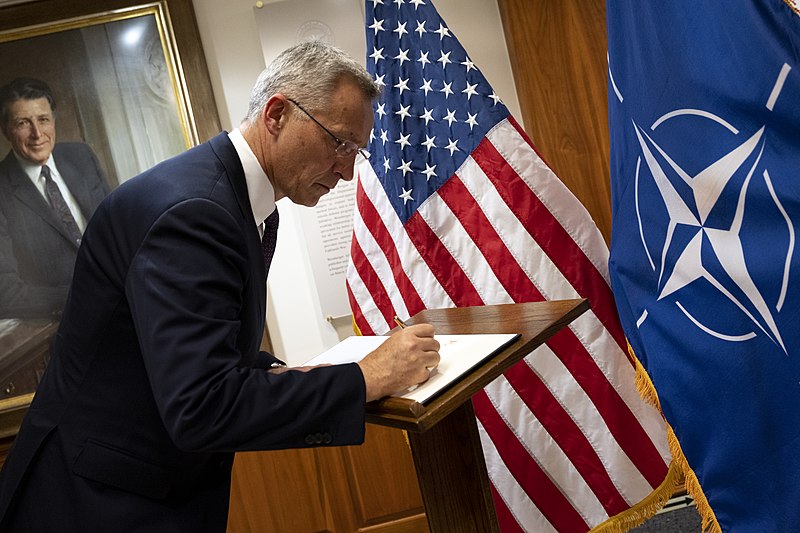The NATO alliance is joining in the efforts to combat climate change as this week, Secretary-General Jens Stoltenberg, announced the alliance’s strategy to reduce greenhouse gas emissions. Stoltenberg said NATO will look to cut down civilian and military greenhouse gas emissions by at least 45 percent by 2030 and to be carbon-neutral by 2050.
In remarks on the sidelines of the NATO Summit in Madrid, Stoltenberg announced the alliance’s plan to combat climate change by reducing greenhouse gas emissions. The NATO chief announced that NATO will aim to reduce civilian and military greenhouse gas emissions by at least 45 percent by the year 2030 and to become carbon-neutral by 2050.
“It will not be easy but it can be done,” said Stoltenberg, adding that reducing emissions would not only help the environment but also help improve military vehicles.
“I believe that in the future, the most advanced military vehicles, and the most resilient armed forces, will be those that do not rely on fossil fuels,” said Stoltenberg.
The recent aim will align NATO with the Paris Climate Accords that were established in 2015. The Paris agreement aims to limit global warming to 1.5 degrees Celsius or 34.7 degrees Fahrenheit.
The alliance’s targets will refer to its own assets like the AWACS surveillance planes, drones that are based in Italy, its headquarters in Brussels, and military headquarters in places like Mons, Naples, and Brunssum. NATO is also looking to help its allies in reducing the carbon footprints of their national militaries.
To note, military emissions are often exempted from emission targets of countries.
The war in Ukraine has led countries such as Sweden and Finland to apply for NATO membership, which faced a challenge in the form of the veto by alliance member-state Turkey. This week, ahead of the summit in Madrid, Turkey has now lifted its veto on Sweden and Finland’s bids for membership, clearing the way for an expansion.
The decision came after four hours of negotiations before the summit began, with all three countries agreeing to protect each other’s security.
With Turkey lifting its veto, Sweden and Finland can proceed with their application to join the alliance, with the steps for the countries’ accession to NATO to be agreed on in the coming days.



 Trump Says “Very Good Talks” Underway on Russia-Ukraine War as Peace Efforts Continue
Trump Says “Very Good Talks” Underway on Russia-Ukraine War as Peace Efforts Continue  Israel Approves West Bank Measures Expanding Settler Land Access
Israel Approves West Bank Measures Expanding Settler Land Access  Japan’s Prime Minister Sanae Takaichi Secures Historic Election Win, Shaking Markets and Regional Politics
Japan’s Prime Minister Sanae Takaichi Secures Historic Election Win, Shaking Markets and Regional Politics  Ghislaine Maxwell to Invoke Fifth Amendment at House Oversight Committee Deposition
Ghislaine Maxwell to Invoke Fifth Amendment at House Oversight Committee Deposition  US Pushes Ukraine-Russia Peace Talks Before Summer Amid Escalating Attacks
US Pushes Ukraine-Russia Peace Talks Before Summer Amid Escalating Attacks  New York Legalizes Medical Aid in Dying for Terminally Ill Patients
New York Legalizes Medical Aid in Dying for Terminally Ill Patients  Sydney Braces for Pro-Palestine Protests During Israeli President Isaac Herzog’s Visit
Sydney Braces for Pro-Palestine Protests During Israeli President Isaac Herzog’s Visit  Trump Allows Commercial Fishing in Protected New England Waters
Trump Allows Commercial Fishing in Protected New England Waters  Taiwan Says Moving 40% of Semiconductor Production to the U.S. Is Impossible
Taiwan Says Moving 40% of Semiconductor Production to the U.S. Is Impossible  Anutin’s Bhumjaithai Party Wins Thai Election, Signals Shift Toward Political Stability
Anutin’s Bhumjaithai Party Wins Thai Election, Signals Shift Toward Political Stability  Trump Lifts 25% Tariff on Indian Goods in Strategic U.S.–India Trade and Energy Deal
Trump Lifts 25% Tariff on Indian Goods in Strategic U.S.–India Trade and Energy Deal  Japan Election 2026: Sanae Takaichi Poised for Landslide Win Despite Record Snowfall
Japan Election 2026: Sanae Takaichi Poised for Landslide Win Despite Record Snowfall  Trump Signs Executive Order Threatening 25% Tariffs on Countries Trading With Iran
Trump Signs Executive Order Threatening 25% Tariffs on Countries Trading With Iran  Federal Judge Restores Funding for Gateway Rail Tunnel Project
Federal Judge Restores Funding for Gateway Rail Tunnel Project  Netanyahu to Meet Trump in Washington as Iran Nuclear Talks Intensify
Netanyahu to Meet Trump in Washington as Iran Nuclear Talks Intensify  Trump Congratulates Japan’s First Female Prime Minister Sanae Takaichi After Historic Election Victory
Trump Congratulates Japan’s First Female Prime Minister Sanae Takaichi After Historic Election Victory  Trump Backs Nexstar–Tegna Merger Amid Shifting U.S. Media Landscape
Trump Backs Nexstar–Tegna Merger Amid Shifting U.S. Media Landscape 































